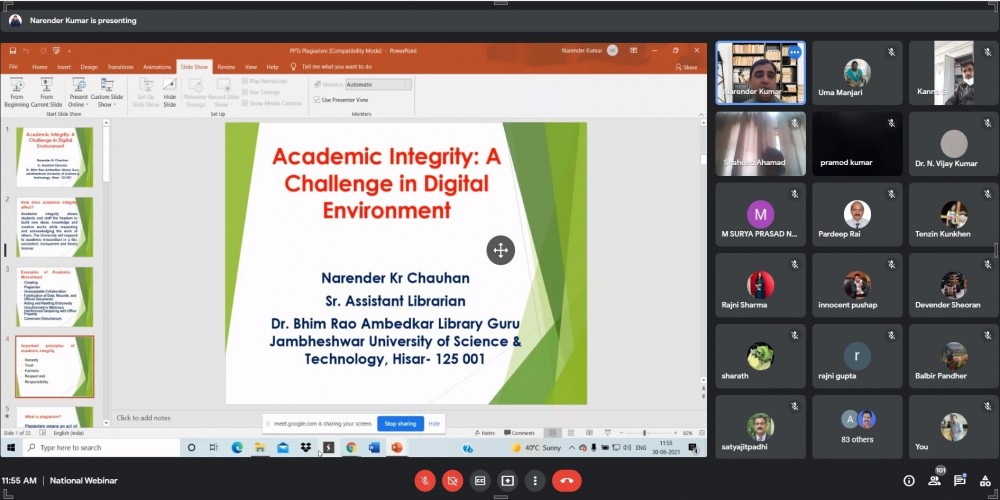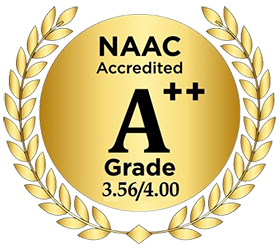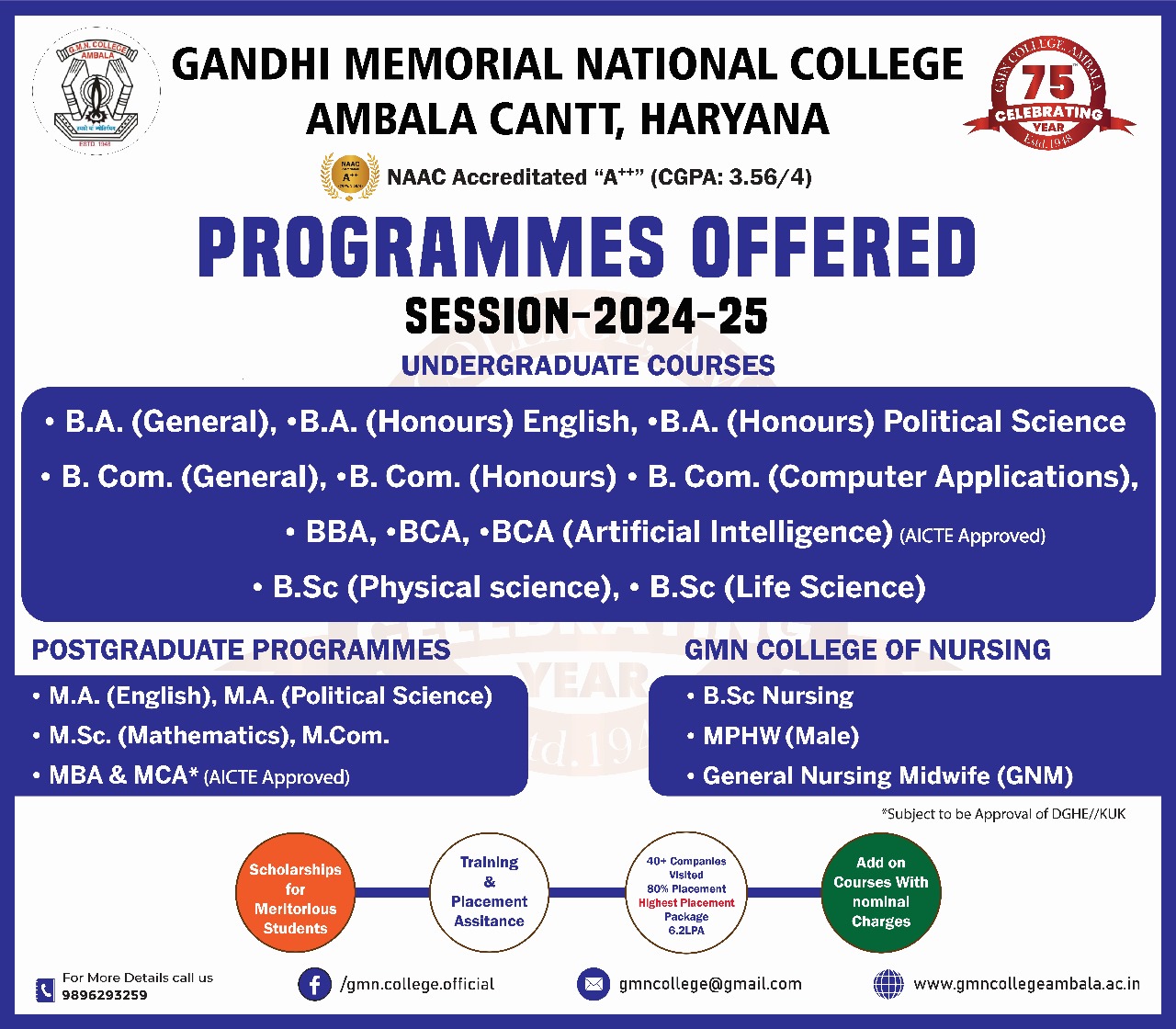National Webinar on “Academic Integrity: A Challenge in Digital Era”

Report
National Webinar on “Academic Integrity: A Challenge in Digital Era”
June 30, 2021, 11:00 A.M.
Gandhi Memorial National College, Ambala Cantt, organized a national webinar on the topic ‘Academic Integrity: A Challenge in Digital Era” on June 30, 2021. The webinar was starts at 11:00 AM. In this webinar, 284 participants from 20 States and 5 Union Territories of India have been registered themselves. Mr Deepak Kumar, Convener and Librarian, G. M. N. College welcomed all the participants and gave a brief introduction to the theme of the Webinar. Dr Raj Pal Singh, Principal of the college, welcomed the delegates and introduce the Guest of Honor, Dr Pardeep Rai, Librarian, Maitreyi College, University of Delhi, and Resource person of the webinar, Mr Narender Kumar, Sr. Assistant Librarian, GJUS&T, Hisar. He further stated that academic integrity should be maintained which a herculean task in this digital environment and put an emphasis on quality work and not on volume of fake research. Mr. Deepak Kumar Convener and Librarian G.M.N. College, read out the objectives and sub-theme to be covered in the webinar and invite Dr Pardeep rai, Guest of Honor to deliver his talk.
Dr Pardeep Rai, said that it is the demand of the time to discuss the academic integrity in the information and communication technology environment as it has changed the basic orientation of the civic societies in general and academic societies in particular. Further, to retrieve the authentic information from the web for academic purposes is not an issue but ethical use of the same is a capacious one. During the session, it has been clearly defined by Dr Rai that what are the merits and demerits of the digital environment. Undoubtedly, research is being carried out in different organisations of the country but our institutional international ranking does not match with the publication’s quantity. Therefore, this is the point where we need to ponder as information is available in abundance form and any one can download the same without paying a single penny. Hence, with the availability of information, qualitative research may be conducted, then why are we lacking in the international ranking?
After then, Resource person of the webinar, Mr Narender Kumar, Sr. Assistant Librarian, GJUS&T, Hisar was invited to deliver his talk. He said that emerging the latest technology, many issues like academic dishonesty and plagiarism stood like a giant against academic and research activities. To control and curb the same, the University Grants Commission has brought a Regulation and published in Gazette of India 2018. He has discussed in detail about the same and described how it is playing a vital role to promote the academic integrity among scholars and how scholars feel safe themselves from the accusation of plagiarism during their research activities. In fact, this is a very prominent document as everything has been defined consciously, even mentioning works exclusion from plagiarism.
1. All quoted works reproduced with all necessary permission and/or attribution.
2. All references, bibliography, table of content, preface and acknowledgements.
3. All generic terms, laws, standard symbols and standard equations.
This is very important information given by the Mr Narender Kumar, Resource person and further he discussed the objectives of Regulations 2018. Moreover, he explained that plagiarism is not the original thinking and it ruins the reputation of individuals and the institution as well. He discussed about the factors contributing to plagiarism which includes external factors i.e., Professors and internal factors i.e., Negative personal attitudes, Lack of awareness, Lack of competence, Negligence, Language issues, educational conditioning, Cultural Background, Issue with time management, Gender issue, Even the subject being studied, and not able to understand the importance of fair research. Apart from the above, he told the types of plagiarism which surely help to understand the concept of plagiarism in a seriatim way.
Further, he discussed in detail about the anti-plagiarism software tools which are currently available in the market and given the live demo of the tool and explained how a scholar can control and curb the plagiarism by using the deterrence tool. In fact, he explained the role of the supervisor in curbing plagiarism onto the platform of tool/s. This is the wonderful part of his talk. In his talk, he said, no machine is available in the market which can detect the plagiarism of any document so far as every deterrence tool shows the similarity only. Teacher/supervisor/guide is only the final arbiter to decide what part shall be included and excluded from plagiarism. Moreover, he advised significantly that plagiarism must be checked in the presence of the concerned guide so that analysis of the report may be done properly and an authentic report may be downloaded.
Last but not least, during his presentation, he said scholars must follow the norms which have been defined by the UGC and concerned HEIs so that qualitative research may be carried out and we may get better ranking in the international market. He warned that the abstract, hypothesis, summary, results, observations and conclusion must be the original one as zero tolerance policy shall be applicable.
In the end, Mr Deepak Kumar, Convener of the webinar and Librarian, G. M. N. College present a vote of thank to Dr Gurdev Singh, Chief Patron & President Governing Body of the college, Dr Raj Pal Singh, Principal & Patron, Dr Pardeep Rai, Guest of Honor, Mr Narender Kumar, Resource Person, all the participants, Dr Chanderpal Punia and Mr Shyam Raheja.
Mr Deepak Kumar
Convener & Librarian
Dr Raj Pal Singh
Principal & Patron



